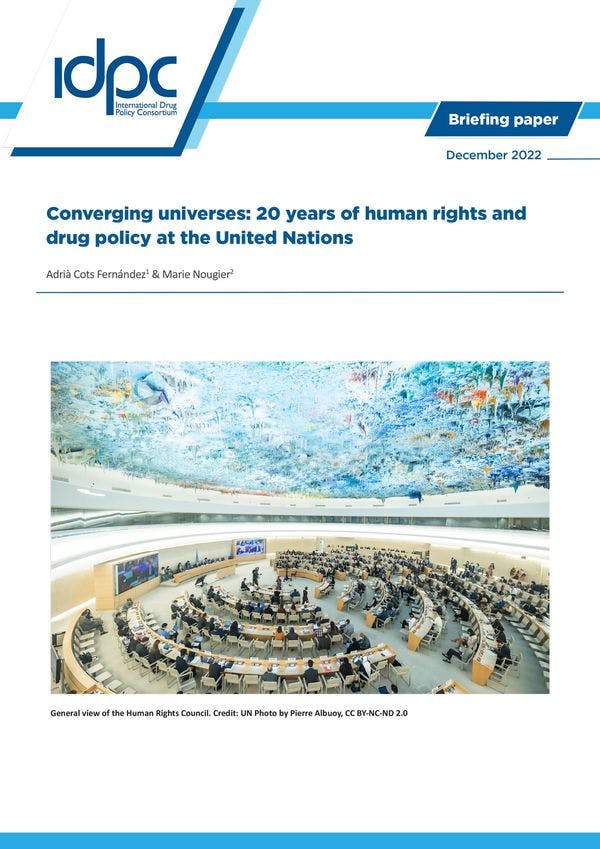Univers convergents : 20 ans de droits humains et de politiques en matière de drogues aux Nations Unies
L'IDPC souligne comment l'implication croissante des entités des Nations unies chargées des droits humains dans les débats sur la politique en matière de drogues a ouvert la voie à une prise en compte plus importante, mais encore insuffisante, de la santé, des droits humains et du développement. Pour en savoir plus, en anglais, veuillez lire les informations ci-dessous.
In recent years, the historical isolation between the United Nations (UN) drug policy and human rights bodies has eroded significantly, and with accelerating speed. The human rights consequences of drug policies have become an unavoidable – if fractious – topic in global drug policy debates, and human rights bodies routinely monitor the impacts of drug responses.
The growing convergence between the UN human rights and drug policy regimes is the result of 15 years of progress across the whole UN environment, with contributions from Geneva, Vienna, and New York-based bodies reinforcing and encouraging one another. Civil society has been a constant and necessary presence, broadening the horizon of what is possible, transmitting key information across the UN system, and consistently advocating for change.
Despite some reluctance to engage in drug-related discussions up until the 2010s, the Genevabased human rights system has become gradually more influential in pushing for this alignment. The first call for convergence between the two regimes came from Geneva, in 2008. Since then, a large number of UN human rights bodies have regarded drug policies to be under their mandate, including the Human Rights Council, the Office of the UN High Commissioner for Human Rights (OHCHR), special mandate procedures, and human rights treaty bodies.
A parallel shift in priorities also took place in Vienna – at least initially. The first, and so far only, resolution dedicated to human rights at the Commission on Narcotic Drugs (CND) was adopted in 2008, thereby legitimising human rights within the agenda of the CND. In the following years, Member States began to incorporate human rights language into plenary statements; new resolutions on topics closely aligned with a human rights approach were adopted. In 2014, the International Narcotics Control Board (INCB) finally condemned the use of the death penalty for drugs offences, discarding its long-standing refusal to acknowledge human rights violations connected to drug control.
These changes were hard fought by progressive Member States and civil society alike. The 2016 UN General Assembly Special Session (UNGASS) on drugs provided an opportunity to accelerate the inclusion of a stronger human rights narrative in drug policy debates across the UN system. This included establishing human rights as a new pillar of the global response to drugs, and the adoption of the strongest negotiated language to date. In part, this progress was due to the unprecedented involvement of UN human rights bodies in the preparations for the Special Session following the first-ever Human Rights Council resolution on drugs in 2015.
The 2015 Human Rights Council resolution was mobilised Geneva-based bodies to increase their attention to drug policies after the UNGASS. Since then, OHCHR has remained steadfastly engaged on the drugs issue, while there has been ever increasing attention from special mechanisms. In parallel, the recommendations provided by human rights treaty bodies have gained in systematicity and ambition. Recent developments such as the announcement of a forthcoming new General Comment on drug policies by the Committee on Economic, Social and Cultural Rights (CESCR), show that this trend will intensify in the future.
The constraints imposed by consensus-based drug policy making and the strong coordination of conservative Member States have blocked progress on human rights language at the CND. Human rights have nonetheless gained visibility and influence at the Commission, thanks to constant pressure from civil society, the increased presence of the OHCHR and human rights mechanisms in Vienna, and the now constant references to human rights by vocal Member States. The centrality of human rights to drug responses is also recognised within the UN System Common Position on drugs, which was adopted by the Chief Executives Board composed of the heads of 31 UN entities in November 2018.
2022 might have marked a turning page in consensus-based policy making on drug-related matters at the UN. First-ever votes took place at both the CND (albeit on a procedural matter), and at the UN General Assembly, where a substantial majority of Member States supported new and strong human rights language in the yearly drugs resolution. Whether the international community is truly ready to finally end the long-standing consensus on UN drug policy on a regular basis remains to be seen. However, this does open the door for new possibilities in global drug policy debates, and shows that a majority of countries now unequivocally support a greater role for human rights and human rights bodies.
